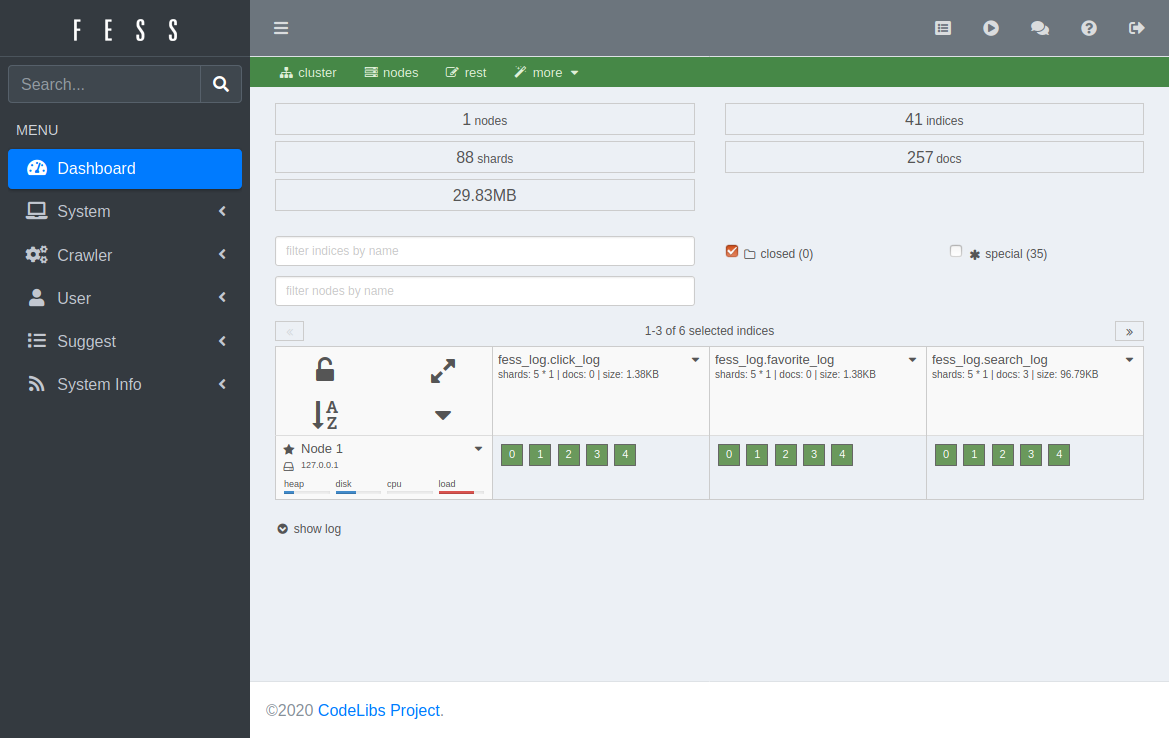- Sort Score
- Result 10 results
- Languages All
Results 1 - 10 of 364 for largest (0.4 sec)
-
README.md
- Admin UI: http://localhost:8080/admin/ (default username/password is admin/admin)  You can register crawling targets in the Admin UI on the (Web, File, Data Store) crawler configuration pages, and then start the Crawler manually on the [Scheduler page](https://fess.codelibs.org/15.3/admin/scheduler-guide.html).
Registered: Sat Dec 20 09:19:18 UTC 2025 - Last Modified: Sat Dec 20 00:28:33 UTC 2025 - 7.8K bytes - Viewed (2) -
fess-crawler/src/main/java/org/codelibs/fess/crawler/entity/RobotsTxt.java
Registered: Sat Dec 20 11:21:39 UTC 2025 - Last Modified: Mon Nov 24 03:59:47 UTC 2025 - 18.5K bytes - Viewed (0) -
src/main/java/jcifs/internal/smb1/trans2/Trans2GetDfsReferralResponse.java
/** * Indicates root targets in the DFS referral. */ public static final int TYPE_ROOT_TARGETS = 0x0; /** * Indicates non-root targets in the DFS referral. */ public static final int TYPE_NON_ROOT_TARGETS = 0x1; private final DfsReferralResponseBuffer dfsResponse = new DfsReferralResponseBuffer(); /**Registered: Sat Dec 20 13:44:44 UTC 2025 - Last Modified: Sat Aug 16 01:32:48 UTC 2025 - 3.6K bytes - Viewed (0) -
src/test/java/jcifs/internal/smb1/com/SmbComLockingAndXTest.java
class SmbComLockingAndXTest { /** * Helper for setting a field via reflection. */ private static void setField(Object target, String name, Object value) { try { Field f = target.getClass().getDeclaredField(name); f.setAccessible(true); f.set(target, value); } catch (Exception e) { fail("Failed to set field '" + name + "'", e); } } /**Registered: Sat Dec 20 13:44:44 UTC 2025 - Last Modified: Thu Aug 14 05:31:44 UTC 2025 - 7.1K bytes - Viewed (0) -
src/main/java/jcifs/SmbConstants.java
*/ int GENERIC_READ = 0x80000000; // 31 // flags for move and copy /** * Target must be a file flag. */ int FLAGS_TARGET_MUST_BE_FILE = 0x0001; /** * Target must be a directory flag. */ int FLAGS_TARGET_MUST_BE_DIRECTORY = 0x0002; /** * Copy target in ASCII mode flag. */ int FLAGS_COPY_TARGET_MODE_ASCII = 0x0004; /**Registered: Sat Dec 20 13:44:44 UTC 2025 - Last Modified: Sun Aug 24 00:49:49 UTC 2025 - 12.8K bytes - Viewed (0) -
src/main/java/org/codelibs/core/io/FileUtil.java
* <p> * <strong>Note:</strong> This method loads the entire file into memory. * For files larger than {@value #MAX_BUF_SIZE} bytes (10MB), an * {@link IORuntimeException} will be thrown to prevent OutOfMemoryError. * For large files, use streaming APIs instead. * </p> * * @param file * The file. Must not be {@literal null}.Registered: Sat Dec 20 08:55:33 UTC 2025 - Last Modified: Sat Nov 22 11:21:59 UTC 2025 - 13.1K bytes - Viewed (0) -
src/test/java/org/codelibs/core/io/FileUtilTest.java
} /** * Test readBytes with large file throws exception * * @throws Exception */ @Test public void testReadBytes_LargeFile() throws Exception { final File largeFile = tempFolder.newFile("large.dat"); // Create a file larger than MAX_BUF_SIZE (10MB) // Write 11MB of dataRegistered: Sat Dec 20 08:55:33 UTC 2025 - Last Modified: Sat Nov 22 11:21:59 UTC 2025 - 10.3K bytes - Viewed (0) -
src/main/java/org/codelibs/fess/helper/SearchHelper.java
Registered: Sat Dec 20 09:19:18 UTC 2025 - Last Modified: Sat Dec 20 05:56:45 UTC 2025 - 36.3K bytes - Viewed (0) -
src/test/java/jcifs/pac/PacCredentialTypeTest.java
} /** * Tests the constructor with a byte array that is larger than the minimal buffer size. */ @Test void testConstructorWithDataMuchLarger() { // A byte array with a length greater than 32 should also be considered too large. byte[] veryLargeData = new byte[100];Registered: Sat Dec 20 13:44:44 UTC 2025 - Last Modified: Thu Aug 14 05:31:44 UTC 2025 - 3.9K bytes - Viewed (0) -
fess-crawler-opensearch/src/main/java/org/codelibs/fess/crawler/service/impl/OpenSearchDataService.java
target.setUrl(getFieldValue(fields.get("url"), String.class)); target.setExecutionTime(getFieldValue(fields.get("executionTime"), Integer.class)); target.setContentLength(getFieldValue(fields.get("contentLength"), Long.class)); target.setRuleId(getFieldValue(fields.get("ruleId"), String.class));
Registered: Sat Dec 20 11:21:39 UTC 2025 - Last Modified: Mon Nov 24 03:59:47 UTC 2025 - 11.1K bytes - Viewed (0)